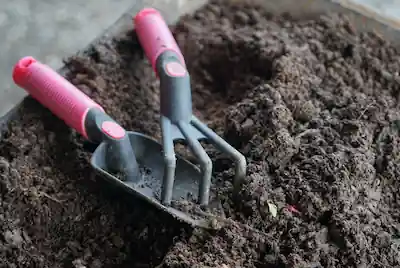It's important to start with small areas and make sure you can care for your plants properly. If you have grown container plants before, start with a small garden plot and slowly increase the size of your garden over time.
- Understand the water needs of your plants
Each plant has different water needs. Some plants require a lot of water, while others are more suited to drier conditions. It is important to find out about the water needs of each plant before planting them in your garden. You can also take into account the climatic conditions of your region. If you live in a very arid region, it will be more difficult to keep the plants healthy. If you live in a more humid region, you will need to ensure that water does not pool around the roots of your plants.
- Water properly
It is important to know how to water the plants correctly. First, be sure to completely wet the root ball of the plant. It is best to do this in the morning or evening, when the sun is less strong, to prevent the water from evaporating. If you water your plants during the day, the water can be absorbed by the leaves and damage the plants.
It is also important to check the quality of the water you use to water your plants. If the water is too hard, it can damage the roots of your plants. It is best to use rainwater or distilled water if possible.
- Feed your plants
It is important to feed your plants regularly to help them grow and develop properly. There are different types of fertilizers that you can use depending on the needs of your plants. Organic fertilizers such as compost, wood ashes and manure are often used to nourish plants in a garden. There are also mineral fertilizers you can use to provide plants with the nutrients they need. It is important to follow the instructions for using these products because they can be toxic to plants if you use too much. In general, it is best to use organic fertilizers such as compost or vegetable peelings. These options are more respectful of the
- Water with care
It is important not to over water the plants as this can drown them out. It is also important not to let them dry out, as this can lead to their death. It is best to water the plants early in the morning or late in the afternoon to allow the water to seep into the soil and prevent the leaves from burning from the sun. You can also use a garden hose with a flow regulator to avoid overwatering. It is also important to check the soil moisture before watering. If the soil is moist, you don't need to water.
- Efficiently feed
It is important to feed plants regularly to give them the nutrients they need to grow and thrive. It is best to use organic fertilizers such as compost or vegetable peelings, rather than mineral fertilizers, to help improve soil structure and for minimal environmental impact. It is also important to follow the instructions for using fertilizers to avoid overusing and damaging them.
In conclusion, watering and feeding plants regularly is crucial for their health and growth. Be sure to water them carefully to avoid drowning them and feed them with organic fertilizers to help them thrive. By following these tips, you can enjoy your garden or vegetable patch for many years to come.
- Keep an eye out for pests
Garden pests can be a real nuisance for novice gardeners, but there are ways to control them. To prevent pest populations from becoming an infestation, it is important to monitor them regularly. Aphids, slugs and snails are common examples of pests that can cause significant damage to plants.
Fortunately, many natural predators can control pest populations. However, when pest populations are very high, it is important to take steps to control them. It is important to watch for signs of infestation, such as distorted leaves or leaf spots, and treat them promptly to minimize plant damage.
Natural ways to control pests include the use of natural predators such as insects and birds, as well as the use of natural repellents such as essential oils. Insecticides can also be used, but it is important to use them carefully to minimize damage to natural predators and the environment.
- Make use of compost
Composting is a great way to recycle kitchen and garden waste, while improving the health of your garden. Compost can be used as a mulch around the base of plants to provide a source of natural nutrients and to retain moisture. It can also help reduce weeds and improve soil structure.
To make compost, you can use a variety of waste materials such as vegetable peelings, fallen leaves, grass clippings and yard waste. It is important to mix this waste regularly to help with rapid decomposition and to avoid the appearance of unpleasant odors.
It is also important to choose an appropriate location for your composter. It should be located in a sunny and well-ventilated place, but sheltered from the weather. Compost can take about a year to completely break down, but it can be used as organic fertilizer throughout this process.
- Adequate watering
Watering is a key element for the success of your garden. Plants need a sufficient amount of water to grow and thrive, but it's also important not to drown them. Individual plants have different water needs, so make sure you know each plant's specific needs before watering them.
In general, it is better to water plants slowly and deeply than to water them quickly and shallowly. Plants need time to absorb water, so be sure to give them plenty of time to drink it. The roots of most plants grow deep in the ground in search of water, so deep watering is important to help them grow properly.
It is also important to consider the weather when watering. Plants do not need as much water during rainy periods, but they need more water during dry periods. Finally, remember that the time of day can also affect watering - it's best to water plants in the morning or evening rather than in the scorching midday sun.
- Choice of plants
Choosing plants can seem daunting, but it's one of the most important decisions you'll make for your garden. Be sure to choose plants suited to your climate and hardiness zone. Plants that are not suited to your climate may grow slowly, fail to flower, or even die.
It is also important to consider where the seedlings will be planted. Some plants like direct sunlight, while others prefer shade. Make sure you know each plant's light requirements before buying and planting them.
Finally, be sure to choose top quality seedlings. Higher quality seedlings often have healthier, more developed roots, which helps them establish faster and thrive faster.
- Use the right amount of water
Watering is crucial for plant health and growth. However, it is important not to overwater them as this can cause problems such as root rot and weed growth. It's also important not to underwater the plants, which can stress them out and weaken them.
It's important to understand each plant's specific water needs and monitor the weather to determine how much water is needed to maintain moist but not soggy soil. If you live in an arid region, you may need to water more often.
Finally, avoid watering the plants in full sun or when the leaves are still wet as this can burn them. Water the plants in the morning or evening to avoid rapid evaporation of water.
- Use adequate fertilizers
Plants need nutrients to grow and thrive. There are many types of organic and mineral fertilizers you can use to provide your plants with the nutrients they need.
Organic fertilizers include materials such as kitchen waste, straw, yard waste, animal waste and ground bones. Mineral fertilizers are chemicals such as nitrogen, phosphorus and potassium that are sold in granular or liquid form.
It is important to understand the specific nutritional needs of each plant and to follow the instructions on the fertilizer packets to avoid overfeeding or underfeeding them. Also, avoid fertilizing stressed or diseased plants as this can weaken them further.
It is also important to remember that nutrients from natural sources such as compost may take longer to break down and become available to plants, but they are safer and more sustainable in the long term for the environment.
- Sufficient light
Light is also an important factor for successful gardening. Make sure your garden gets enough light for each type of plant you want to grow. Some plants need more light than others, so be sure to choose the right plants for the brightest and darkest areas of your garden.
It is also important not to expose the plants to excessive light conditions, as this can stress and weaken them. If you have shady areas in your garden, consider planting ferns or other plants that are adapted to low light conditions.
In conclusion, gardening can be an exciting and rewarding hobby, but it's important to understand each plant's needs to ensure a thriving and healthy garden. By following these tips for beginners, you can create a beautiful garden that will bring you joy for years to come.
In conclusion
Gardening and vegetable gardening are exciting and rewarding activities that can provide many benefits, both for the gardener and for family and friends. Tips for gardening and vegetable gardening beginners include monitoring pests, using compost, proper pruning, proper watering, and using sufficient light. By following these simple steps, you can develop a healthy, thriving vegetable garden and garden that will bring joy and pride to you and your family.
Watering is an important aspect of gardening to maintain plant health. It is important to understand the water needs of each plant and not to over or under water. Be sure to water enough so the soil is moist to a depth of 4 to 6 inches, being careful not to let water sit on the leaves or on the stems of the plants. It is best to water plants in the morning or evening rather than during the hottest hours of the day to prevent water evaporation and damage from the sun's rays.
Light is also an important factor for successful gardening. Make sure your garden gets enough light for each type of plant you want to grow. Some plants need more light than others, so be sure to choose the right plants for the brightest and darkest areas of your garden. Avoid exposing plants to excessive light conditions, as this can stress and weaken them. If you have shady areas in your garden, consider planting ferns or other plants that are adapted to low light conditions.
Using the tips outlined above, you can build a thriving garden and vegetable patch that is pleasing to look at and easy to maintain. Whether you're a beginner or an experienced gardener, gardening and vegetable patching can provide you with many benefits, including a source of fresh food, a calming distraction, physical activity, a way to connect with nature, and so much more. If you are looking for new rewarding activities, gardening and soup can be a great option for you. In addition to allowing you to develop your plant care skills, these activities can also provide you with a healthy food source for you and your family. Besides,
Gardening and vegetable patches can be very rewarding activities for beginner gardeners, but it is important to remember that it can take time to achieve satisfactory results. This is why it is important to show patience and perseverance in your approach.
By following the tips for gardening and vegetable gardening beginners, you can quickly develop your skills and build a thriving and thriving garden. Plus, by learning basic gardening techniques, you can also learn how to choose the right plants for your garden, grow them successfully, and care for them to keep them healthy.
Finally, don't forget that gardening and the vegetable garden can be very entertaining and relaxing activities. By spending time in your garden, you can develop a sense of satisfaction and pride in watching your plants grow and bloom. It's a great way to connect with nature and strengthen your bond with the earth.
gardening and vegetable patching can be rewarding and fulfilling activities for beginning gardeners. By following the tips for beginners and exercising patience and perseverance, you can develop your skills and build a thriving, thriving garden that will bring you joy for years to come.






